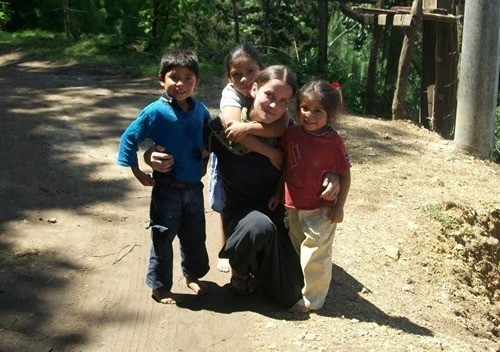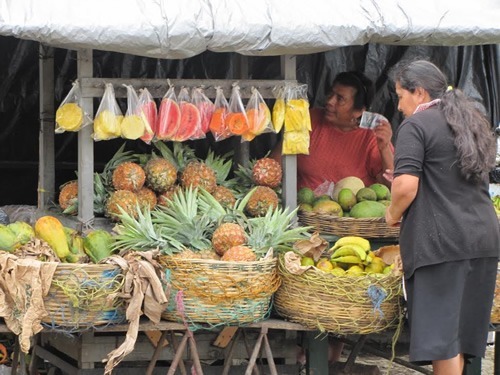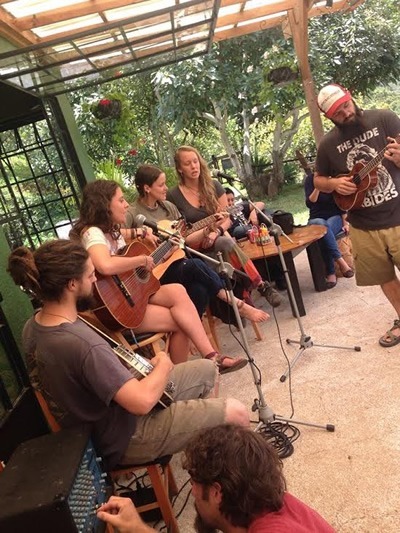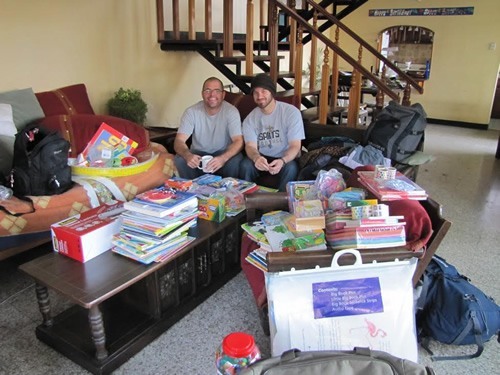How to Be a Happy Expat and Enjoy Your Life Abroad
Giving Proper Respect to Local People and Culture is Key
Article and photos by Jonathon
Engels
5/10/2016, updated 10/5/2023 by TransitionsAbroad.com
 |
|
Building relationships with people from the local community often creates unbelievable bonds that cross cultures and reach deep into the hearts of everyone involved.
|
After the distinction between expat and immigrant was pointed out, the label "expat," which I've used for several years, has grown uncomfortable, the terminology more glaring and irksome. Back in the USA, people from elsewhere are considered immigrants, except those with Western European backgrounds. But, wherever I've lived — Korea, Guatemala, Russia, Turkey, Panama, or Palestine — my status was always the loftier "expat." Seemingly based on the economic hierarchy, race, and origin, expats are wealthy and white, while immigrants are often less so.
To be transparent, there may be some element of guilt in my worry. Still, I've noticed how the terminology, namely the overly positive outlook about the expatriate position in society, can sometimes produce a less-than-gracious guest. In other words, at home, we expect immigrants to be part of the society around them. In contrast, it often seems expats disregard — in some cases flat-out shun — their presumably adopted countries. If I'm going to be called an expat — which often seems to be the case — I don't want to be that sort of expat.
Fortunately, not all or even most expats behave this way. Many are great additions to their host country and local community. The lives of expats tend to be enriched by their location, not just because it may seem like paradise or cheap or lax in its laws, but because their relationship with the country, its land, and its people is of extraordinary value. Happy expats are grateful guests. Better yet, they feel completely at home, and such is the case for several reasons.
Happy Expats Live Locally
 |
|
Living in the tropics means a year-round abundance of fresh fruit with low food miles and tip-top flavor. Every place has its own version of fruit that the locals particularly appreciate.
|
As working and retiring abroad has become increasingly the trend, somewhat regrettably at times, this has also resulted in emerging networks of closed-off expat communities with supermarkets full of imported products and satellite links to television stations back home. Such a manner of living abroad often creates an unfulfilling existence, longing for things that aren't available in the host country and disappointment in the things that are. In essence, it's a calculated arrangement that presumes life in your chosen country is insufficient.
Most happy expats that I have encountered enjoy what's local. They relish the foods, fresh produce, and other distinctive choices linked to their current location. They appreciate the public parks, town squares, and rural hiking paths. They utilize farmer's markets, public transportation, and real (not international chain) restaurants. Happy expats embrace their new location as if it is intrinsically home, loving its unique comforts and accepting (often appreciating) the lack of what they could get elsewhere.
Happy Expats Know Their Neighbors
Often, it seems that in the so-called "First World," we have increasingly isolated ourselves. Our sense of community has regressed as more advanced technologies and economies have advanced. Families — forget strangers — grow further apart, with homes including "man caves" and separate playrooms for the kids. Such isolation quickly escalates into cultural segregation and self-imposed quarantine when living abroad. Life, once again, becomes overly sterilized and painfully impersonal, only now further away from the familiar back home.
 |
| Music has been a universal language in every country I've lived in. There are always new musical partners to play with and people to entertain. |
The happiest expats generally have social lives, truly enjoy direct human interaction, and have meaningful friendships. They are cordial to colleagues, chat with neighbors, and welcome people into their lives. Happy expats are interested in others, accept cultural differences, and recognize community needs. They know their neighbors, expats, and locals alike and foster relationships with the guy running the shop or the lady from the café. Consequently, even though family and friends may be distant physically, the happiest expats never feel alone.
Happy Expats Learn the Local Language
For many people, a new language is one of the most alarming aspects of moving abroad. This can be an impediment, making even the simplest things — ordering at a restaurant, getting a phone, telling a driver where to go, reading signs — more challenging. When our ability to communicate verbally, as we are accustomed to, is taken away, it can leave many of us with a helpless and antagonistic view of the world. Even with a language in common, sometimes communicating is wrought with new intonations, turns of phrase, and forgotten words.
Luckily, the solution is simple: Learn the local language. While not all of us are linguistically gifted, just about anyone, with honest motivation and a couple of months, can pick up enough of a new language to survive. Those expats who make it their mission to master the mother tongue of the land find themselves not just skillful but even more intrigued by what's happening around them. As more permanent guests, the onus is to adapt rather than expect an entire country to cater to our needs. Doing so makes life so much more satisfactory for all parties involved.
Happy Expats Acclimate and Assimilate
I've often watched recent expats struggle with the transition, their cell phones either glued to their ears or their eyes glued to the phone. They pine for the pizza shop they used to go to every Friday. They miss the family, the friends, the dog, the car, the city they left. They spend so much time worrying about what's gone that they fail to recognize what's in front of them and forget why they came in the first place. As a result, their new home never feels like home; they try to bring their own home from home. Unhappy expats may find their new life unsatisfactory as they fail to immerse themselves in a new, inviting, exciting culture.
Industrious expats evolve. Instead of constantly trying to pull the past along with them, bringing their home wherever they go, they explore the bounds of what's to come. Some expats stubbornly search for a new pizza shop to continue an old tradition or switch the Friday meal to a taco stand down the road. They may miss their family and friends, but rather than mourn their immediate absences, they plot out the possibilities for frequent future visits. Accepting and adjusting are necessities for a happy life abroad, or anywhere for that matter.
Happy Expats Offer a Helping Hand
Since willing expats generally come from more privileged economic positions, economically and perhaps educationally, living abroad is the perfect time to enjoy their luck. While focusing on the newfound luxury and freedom that those dollars or pounds afford is tempting, it's essential to recognize those around us who weren't born into such circumstances. Contrary to many a sales pitch, living abroad is not solely about the cost of living and affordable housing — at least not for the responsible expat.
 |
| Being involved with local initiatives to improve people's lives is gratifying. Bryant, the founder of Las Manos de Christine in Guatemala, and I sit with the bounty of a material fundraiser that Emma and I organized. |
Nearly every energetic and enlivened expat I've known helps in some way. This could involve helping the neighbors by dropping someone off at work every morning. It could be fundraising or volunteering for an NGO. It could be taking a particular fondness for an employee and their family, ensuring their lives are fruitfully influenced by the association. Without a doubt, expatriating can make our money stretch, but only coldly taking advantage of that benefit will not result in the good life. Instead, the ability to share our health, wealth, and hearts creates happiness for all.
Happy Expats Practice Patience
Generally, in "paradise," the pace and way of living changes. Western folk are accustomed to tight schedules, uber efficiency, and manicured customer service. Yet, these materialistic or commercial aspects of living are different from how much of the rest of the planet operates. When you are an expat, often reams of red tape, casual tardiness, and slowly sauntering through the thick of it are how life goes. Living in such a way may not always make sense, but neither does paying $3.50 and up for a coffee for a lower-wage worker back home.
Realistically, to keep from going completely insane and losing your cool every other day, wise expats are patient. Life will go on. Things will get done. If that ever seems in doubt, it's as easy as realizing that the rest of the expat and local population manages to make it through life quite content. Besides, some leave hectic homes for more meditative and peaceful lifestyles elsewhere. It makes no sense to get upset that the locals are living that way, too. Patience, sometimes only realized in retrospect, is the crux of how expats exist blissfully.
Happy Expats Accept That They Are Immigrants
 |
| Here I am speaking with Greg Kemp of Project Somos. Beside us is his beautiful earthbag home, and in the distance, before the stunning landscape, are the homes of local families with single mothers with whom he works daily. |
The most respectful expats realize they are immigrants and know they are no better than those around them. Happy immigrants and expats, whatever term we choose, should (and typically do) positively impact their host countries in human and material ways. That usually means being a good guest by respecting the people amongst whom they've chosen to live and the nation in which they've decided to settle. Expat income spent locally can also help with the local community's needs. While the identities of expats may be tied to foreign origins, happy expats become part of a new community. They are thankful for the good fortune in the country where have choosen to live.
 |
Jonathon
Engels earned an MFA in creative writing.
He has lived, worked and/or volunteered in seven
different countries, traveling his way through
nearly 40 countries between them. His many interests include permaculture, veganism, and ways to live sustainably.
|
|
